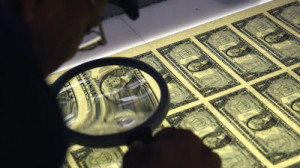Bloomberg
by Souhail Karam
Morocco’s central bank said it has revised the Moroccan dirham’s currency peg after the weakening of the euro against the U.S. dollar.
It’s a “first step in the transition toward a more flexible exchange regime aimed at strengthening competitiveness of the country and resilience of its economy to external shocks,” Bank Al-Maghrib said in a statement on its website. It doubled the U.S. dollar weighting to 40 percent while it cut by a quarter the weighting of the euro to 60 percent. Morocco has a managed float exchange-rate system.
The adjustment “will act as a tightening monetary policy with a de facto sudden appreciation of the Moroccan dirham, after it had lost about 25 percent of its value in the last year,” Standard Chartered senior economist Philippe Dauba-Pantanacce said. “About 75 percent of Morocco’s external debt is in euro and this re-balancing of the foreign exchange, with a relatively stronger the U.S. dollar, this could also bring some breathing space.”
The central bank expects the $93-billion, agriculture-reliant economy to expand by 5 percent in 2015 after good rainfall, while the tourism sector, the second-biggest employer and an important foreign currency earner, is struggling to pick up after declining in 2014 mostly as fewer Europeans visited.
Bank Al-Maghrib had announced plans to revise the currency peg in December. In February, the International Monetary Fund said monetary policy has been appropriate and that based on “the improving macroeconomic situation, the directors supported transitioning to a more flexible exchange rate regime.”
Such a move would “would foster trade and financial flows diversification while helping preserve competitiveness and better insulating the economy against shocks,” the IMF said.
Standard Chartered Dauba-Pantanacce’s doubts this would happen quickly.
“The risks associated with managing a free float, a relative conservatism on the subject and the perception that a tightly managed basket has done the country more good than bad – – all leads us to think that forex flexibility is not on the cards just yet,” he said in an e-mailed reply to questions.








